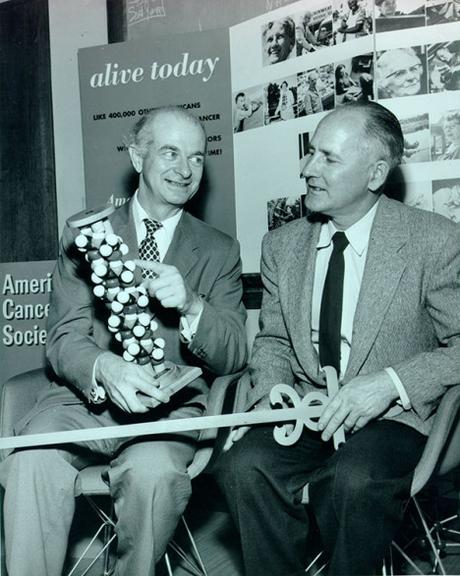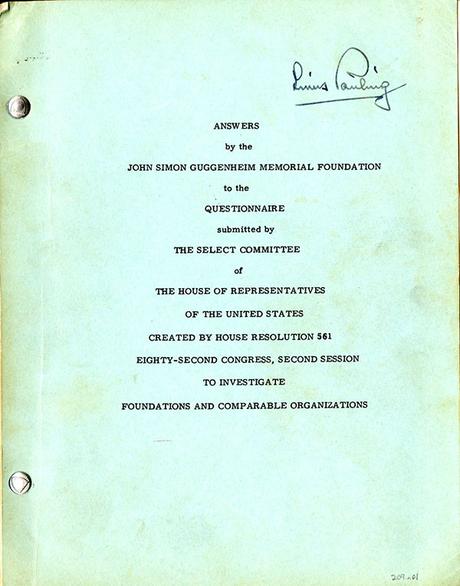 Linus Pauling and George Beadle, circa 1950s
Linus Pauling and George Beadle, circa 1950s[Pauling and the Guggenheim Foundation]
At the end of 1952, Guggenheim Foundation Secretary Henry Allen Moe found himself working night and day for several weeks to answer a series of questions sent by the House of Representatives Select Committee to Investigate Tax-Exempt Foundations and Comparable Organizations, also known as the Cox Committee.
Once he had completed this onerous task, Moe sent a copy of the 329-page response to Linus Pauling and other members of the Foundation’s Committee of Selection. Pauling, along with his Caltech colleague George Beadle, carefully reviewed the document, and after a period of discussion, Pauling wrote to Moe on December 29 to share his thoughts.
Pauling prefaced his remarks by telling Moe that he was impressed overall and that the response was what he would expect. He did, however, wish to share some “constructive criticism” related to phrasing used in a section on the approval of foreign applicants; a portion of the response that he felt was beneath the “dignity” of the Foundation and risked sacrificing its independence to governmental control.
The passage in question had described the expectation that the Foundation would only grant awards to foreign applicants who had been approved for visas by the State Department. Pauling felt that this stipulation was fraught and gave the government too much influence in the selection process.
The stipulation also surely brought to Pauling’s mind his own inability to obtain a passport earlier in the year, a rejection that came after Pauling had been invited to attend a conference at the Royal Society of London. Pauling believed that if the Royal Society had been obligated to ask the State Department about his passport worthiness in advance, the end result would that he would not have been invited to the meeting at all. Beadle agreed with Pauling’s point of view.

For Moe, answering the Cox Committee inquiry had siphoned away a great deal of time from other pressing duties, and had left him exhausted, stressed, and slow to respond to correspondents, including Pauling. All of these factors came to a head when he finally did write back to Pauling, some two weeks later. Moe clearly took offense at Pauling’s “constructive criticism” and, in a lengthy letter, he addressed those concerns while also taking personal shots at Pauling. The back and forth resulted in lasting damage to what had been a strong relationship shared between colleagues and friends of long standing.
Moe began by explaining that the answers submitted to the Cox Committee were those of the Foundation, not his personally, and had been vetted in detail before their approval by the Board of Trustees. As such, Moe was unable to express any agreement with Pauling’s assessment even if he wanted to…and he did not want to.
Specific to Pauling’s criticism, Moe believed that he had taken the section about visas out of context. For Moe, the passage in question needed to be read as part of the whole document; one that affirmed that only the proper governmental agencies could decide on matters of national interest. In the case of travel visas, the proper governmental agency was the State Department.
Moe also objected to a notion that he believed Pauling had read into the text; namely, that the Foundation welcomed governmental approval of its decisions. He instead clarified that the Foundation would grant awards but would withhold notification until the State Department had approved them. For individuals who were denied clearance, the Foundation would offer to hold the grant in place for the applicant while they appealed the government’s ruling.
 The conclusion to Moe’s letter to Pauling of January
The conclusion to Moe’s letter to Pauling of January Once he had clarified these points, Moe then shifted to a more personal response, one that questioned Pauling’s social judgments. “In these matters of human relations,” he wrote
people do not act like atoms or molecules – i.e., always in the same relation to the same circumstances. Human judgments, which is what we are talking about now, do not occur with the certainty of chemical reactions. Nor is a chain of reactions – one thing leading to another, as you develop it out at the end of the first paragraph on page 2 of your letter – likely to occur in human relations. It is the political genius of the Anglo-Saxon people that such – thought-to-be-logical – ultimates are not permitted to occur.
In this, Moe sought to emphasize his feeling that Pauling had failed to understood the complexity of the situation, one that involved balancing the ideals of civilization with the imperative to remain safe and secure.
To make his point, Moe quoted legal scholars including the nineteenth-century English lawyer William Edward Hall, author of A Treatise on International Law. In it, Hall explained that countries could refuse entry to foreigners, but that doing so meant “to withdraw from the brotherhood of civilized people.” Hall continued
If a country decides that certain classes of foreigners are dangerous to its tranquility, or are inconvenient to it socially or economically or morally, and if it passes general laws forbidding the access of such persons, its conduct affords no grounds for complaint. Its fears may be idle; it legislation may be harsh; but its action is equal.
While Hall wrote within the context of a state’s justification to deny entry to immigrants, Moe explained that the Foundation was doing what it thought best under the more contemporary circumstance of an escalating cold war. This noted, Moe then suggested that by discretely clearing visas for potential fellows before notifying the applicants themselves, the Foundation was actually protecting these individuals from negative exposure that might potentially wreck a career during anxious times. This point spoke directly to Pauling’s own situation and the slander that he had suffered following the Congressional testimony of FBI informant Louis Budenz, a former Communist Party member who had stated that Pauling was also a member of the party’s ranks.
Moe ended his reply by taking one last stinging jab at Pauling’s judgment, this time drawing a connection between Pauling’s claim about the Royal Society invitation and his own testimony before the Cox Committee. Moe’s frustration is clearly evident as he ups the rhetorical ante:
When, in my testimony, I associated political naivete and professional eminence, you were one of the eminent professionals I had in mind. This, without saying so now, you would know from previous letters I have written you. It is my opinion that if you had studied the subject matter of your letter of December 29 one-tenth as critically as you study your chemistry, you would not have taken so untenable a set of positions as you take in your letter.
Moe concluded by informing Pauling that he and Beadle were the only two people who had expressed concern about the Foundation’s independence. Indeed, the only other objections that Moe had fielded were sent by those who believed that the Foundation ought to submit to greater levels of governmental control.
If Pauling responded to this letter it does not remain extant. What is readily apparent, however, is a noticeable shift to formality in the exchanges that followed. Just eighteen months prior, Pauling had invited Moe to visit Pasadena and spend a couple weeks relaxing at his pool. But going forward, the colleagues would correspond with one another on strictly professional grounds.
